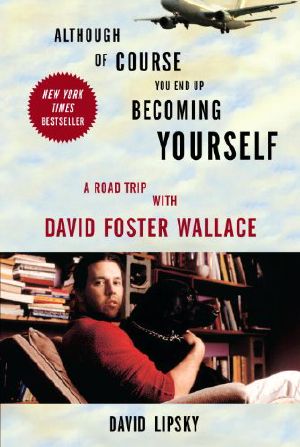Although of Course You End Up Becoming Yourself · A Road Trip With David Foster Wallace

- Authors
- Lipsky, David
- Publisher
- Broadway
- Tags
- writing , language arts & disciplines , autobiography , personal growth , biography & autobiography , authors; american , literary , 20th century , general , self-actualization (psychology) , biography , psychological aspects , composition & creative writing , self-help
- ISBN
- 9780307592439
- Date
- 2010-01-01T00:00:00+00:00
- Size
- 1.87 MB
- Lang
- en
In David Lipsky’s view, David Foster Wallace was the best young writer in America. Wallace’s pieces for *Harper’s* magazine in the ’90s were, according to Lipsky, “like hearing for the first time the brain voice of everybody I knew: Here was how we all talked, experienced, thought. It was like smelling the damp in the air, seeing the first flash from a storm a mile away. You knew something gigantic was coming.”
Then *Rolling Stone* sent Lipsky to join Wallace on the last leg of his book tour for *Infinite Jest*, the novel that made him internationally famous. They lose to each other at chess. They get iced-in at an airport. They dash to Chicago to catch a make-up flight. They endure a terrible reader’s escort in Minneapolis. Wallace does a reading, a signing, an NPR appearance. Wallace gives in and imbibes titanic amounts of hotel television (what he calls an “orgy of spectation”). They fly back to Illinois, drive home, walk Wallace’s dogs. Amid these everyday events, Wallace tells Lipsky remarkable things—everything he can about his life, how he feels, what he thinks, what terrifies and fascinates and confounds him—in the writing voice Lipsky had come to love. Lipsky took notes, stopped envying him, and came to feel about him—that grateful, awake feeling—the same way he felt about *Infinite Jest*. Then Lipsky heads to the airport, and Wallace goes to a dance at a Baptist church.
A biography in five days, *Although Of Course You End Up Becoming Yourself* is David Foster Wallace as few experienced this great American writer. Told in his own words, here is Wallace’s own story, and his astonishing, humane, alert way of looking at the world; here are stories of being a young writer—of being young generally—trying to knit together your ideas of who you should be and who other people expect you to be, and of being young in March of 1996. And of what it was like to be with and—as he tells it—what it was like to become David Foster Wallace.